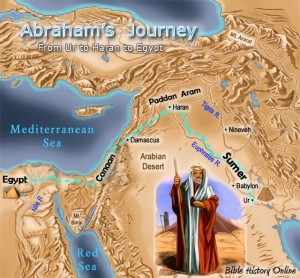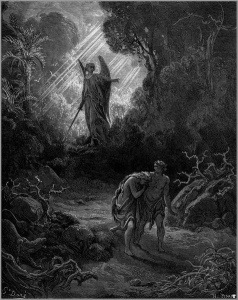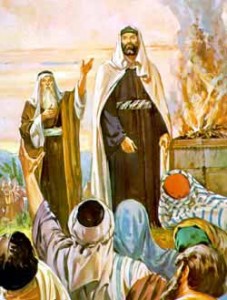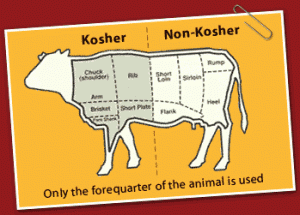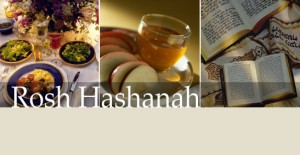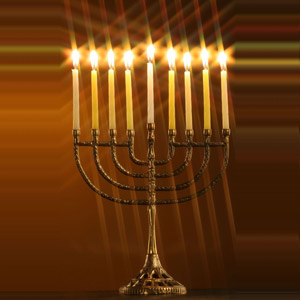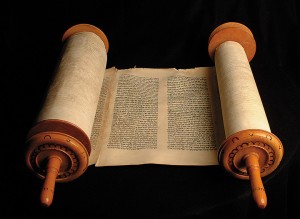Judaism
Judaism is one of the oldest religions of the world. It was founded around 2,000 B.C. when Abraham, considered the father of Christianity, Islam, and Judaism, decided to follow one God, Yahweh. He left his home in Ur, and traveled across what is now the Middle East.
Source: http://www.bible-history.com/maps/6-abrahams-journeys.html
Abraham and his descendants suffered many hardships, including 400 years of slavery in Egypt (according to the Hebrew Bible; the Egyptian records hold little information about this group of people- the Hebrews- and what little is explained does not match up date-wise with the Bible). The Hebrews were freed from slavery in Egypt, after God performed many miracles through Moses, and went to the Promised Land (a.k.a. Canaan/modern-day Israeli-Palestinian area) where they fought the residents for ownership of the land.
The Hebrews were also known as Israelites, named after Abraham’s grandson Israel (whose birth name was Jacob). They eventually argued with Yahweh about having a human king, similar to the kingdoms around them, for at first they only had priests as Yahweh was to be their king. Yahweh used his prophet Samuel to choose Saul to be king over Israel. Saul was then usurped by David who united the 12 tribes of Israel (each tribe descended from one son of Israel/Jacob) into the Kingdom of Israel. After David’s son Solomon died, the Kingdom split in two: the Northern Kingdom of Israel and the Southern Kingdom of Judah (named after the largest tribe in that kingdom). The Northern kingdom had 10 tribes and the Southern kingdom had 2.
In 722 B.C., the Northern Kingdom was attacked and overtaken by the Assyrian empire. The Israelites were sent into exile and never returned.
In 586 B.C., the Southern Kingdom was attacked and overtaken by the Babylonian empire. Around the turn of the century, the Persian Empire conquered the Babylonians and allowed the Israelites to return home, though they were now known as Judahites.
The Judahites (Jews) were allowed to rebuild the temple that the Babylonians had destroyed and were pretty much left alone until the Roman Empire conquered the Greeks who had previously conquered the Persians. The Jews refused to make sacrifices to the Roman gods and goddesses, and thus the Maccabean revolt was begun. Eventually the Romans defeated the revolt and placed Roman officials in charge of Israel.
The Jews became passive and were allowed to continue their religion and not make sacrifices to the idols as long as they prayed to Yahweh for the continued health and well-being of the Roman Emperor.
Peace reigned until 67 A.D. when another Jewish revolt was started. The Romans defeated the Jews in 70 and accidentally burned down the Temple, leaving only the West wall (today known as the ‘Wailing wall’) and the foundation (on which the Islamic ‘Dome of the Rock’ is placed). The Jews were exiled from Jerusalem and lived in small communities throughout the world until the Jewish state of Israel was founded in 1948.
Religious Text:
-Hebrew Bible (Christian Old Testament):
- Consists of three parts:
- Law – First five books
- Writings – The stories and chronicles (Esther, Judges, 1 and 2 Kings, etc.)
- Prophets* – The three major prophets (Jeremiah, Isaiah, and Ezekiel) and the 12 minor prophets (called ‘minor’ because they are shorter in length than the ‘major’ prophets; has nothing to do with importance or authority of the prophet – Hosea, Joel, Amos, Obadiah, Jonah, Micah, Nahum, Habakkuk, Zephaniah, Haggai, Zechariah, and Malachi)
- Traditionally believed to have been written by Moses
*A prophet is someone who has visions of what will happen in the future. In Judaism, they include at least 15 men who see visions, and tell people about them, that show what will happen to Israel if the Jews do not turn from their idol worship and back to Yahweh.
-Apocryphal texts:
These are stories and teachings that were not considered credible by the Jewish scholars that developed the Hebrew Bible canon from the 4th century B.C.E. to the 4th century C.E. Their authorship is either inconclusive (and so cannot be included because the authority of the text is thus questionable) or the teachings are contradictory to the rest of the canon or they are too outlandish and confusing.
Some of these are:
- Joseph and Aseneth
- The Book of Enoch
- The Testament of Moses
Though these stories were not canonized, they are still well known by scholars and commoners alike. Scholars know that people were reading these stories because “The Book of Enoch” and “The Testament of Moses” are both quoted in the New Testament (Christian portion of the Bible, not included in the Hebrew Bible) book of Jude.
Important Figure(s):
-Adam and Eve
- First humans created by God.
- They lived in harmony with God, each other, and animals in the Garden of Eden, which was a perfect place.
- Eve was tricked by a snake to eat the fruit of the Tree of Knowledge of Good and Evil, which Adam and Eve were not supposed to eat. Eve then gave the fruit to Adam, and they then realized that they were naked and they became ashamed.
- God kicked them out of the Garden of Eden and they then had to work the land and fend for themselves.
- They had two children, Cain and Abel, then Cain killed Abel because Abel’s sacrifice to God was considered better than Cain’s and Cain became jealous.
- Adam and Eve then had another son, Seth.
- Adam lived to be 930 years old (Eve’s years are not given to us).
Source: http://commons.wikimedia.org/wiki/File:Adam_and_Eve_Driven_out_of_Eden.png
-Enoch
- 6th generation descendant of Adam and Eve.
- He walked with God for 300 years after having his son at age 65.
- “Enoch walked with god; then he was no more, because God took him away.” (Genesis 5:24)
- Enoch is one of two (Elijah the prophet being the other) to be reported as not dying but as God simply taking them away.
-Abraham
- The father of the people of Israel.
- First to believe in and follow Yahweh.
- Showed his devotion in his willingness to sacrifice his son (though the sacrifice ended up being of a lamb rather than his son, Isaac).
- Makes a covenant with Yahweh that includes circumcision of the male eight days after his birth.
-Jacob/Israel
- Father of the 12 tribes of Israel ((eldest-youngest: Reuben, Simeon, Levi, Judah, Dan, Naphtali, Gad, Asher, Issachar, Zebulun, (then a daughter, Dinah), Joseph, and Benjamin).
- Wrestles (physically) with Yahweh (who has taken on human form and at first appears to be an angel) and has his name changed to ‘Israel’.
-Moses
- Leads Hebrews out of Egypt after having heard Yahweh speak through a burning bush.
- Receives the 10 commandments (and the other laws mentioned throughout the Torah) on Mount Sinai.
- Renews Abraham’s covenant with Yahweh (the circumcision and the following of the laws in return for Yahweh’s love and protection and blessings).
-Aaron
- Brother of Moses.
- First High Priest.
- Of the tribe of Levi, so all priests must be of the tribe of Levi and only those descended from Aaron can become the High Priest.
Moses and Aaron.
Source: http://www.brooklynyid.com/2010/01/14/smooth-talker-parsha-essay-torah-reading-vaera-exodus-62-935/
Beliefs/Teachings:
-There is one God, Yahweh.
-He has made the people of Israel his chosen, and therefore he loves them and protects them from their enemies (as long as they worship and love him only).
-The Ten Commandments
- You (here ‘you’ refers to the people of Israel and ‘me’ refers to Yahweh) shall have no other gods before me.
- You shall not make for yourself an idol in the form of anything in heaven above or on the earth beneath or in the waters below.
- You shall not misuse the name of the Lord your God.
- Remember the Sabbath day by keeping it holy.
- Honor your father and mother.
- You shall not murder.
- You shall not commit adultery.
- You shall not steal.
- You shall not give false testimony against your neighbor.
- You shall not covet your neighbor’s house. You shall not covet your neighbor’s wife, or his manservant or maidservant, his ox or donkey, or anything that belongs to your neighbor.
From: Exodus 20:3-17
-Israelites must keep kosher* (here are a few rules)
- Cannot eat pig.
- Cannot have meat and dairy on the same plate.
- Cannot eat meat of any animal that walks upon the sea floor (crustaceans).
- Can only eat certain parts of the cow.
Source: http://www.kveller.com/blog/parenting/eating-placenta-aint-kosher/
*Kosher in those days meant following the dietary and clothing restrictions in order to be kept clean and pure. Today, one can buy kosher salt at the grocery store; this kosher simply means that it was blessed by a Rabbi.
-Taking care of the orphan, the widow, and the poor is very important.
-Israelites are not to marry those outside the faith. If the person converts, it is OK to marry them.
-Treat others the way that you wish to be treated.
Holidays:
-Yom Kippur*- The ‘Day of Atonement’. Believers fast and pray for 25 hours, repenting for their sins. It is the holiest of holy days. It is the tenth day of the seventh month and ends the period of festivals that started with Rosh Hashanah (the first day of the seventh month).
-Rosh Hashanah*- First day of the seventh month and starting the ten day period that ends with Yom Kippur. It is also known as the Jewish New Year. It is on this day that it is believed that God created Adam and Eve, the first male and female, respectively.
Source: https://chabadstanford.org/events.htm?Rosh-Hashanah-2013-12
-Feast of Unleavened bread (Passover) – Celebrates the time when God spared the first-born sons of the Hebrews while they were suffering in Egypt. The first-born sons of the Egyptians were killed. The Hebrews marked their doors with lamb’s blood and the spirit of God passed over their home (hence the name ‘Passover’). It is called the Feast of Unleavened bread because the Hebrews were freed from slavery the following day and had no time to put the yeast into the bread to let it rise. Matza bread is unleavened (without yeast and so it is flat) and is eaten during this celebration.
-Purim- Esther (whose Jewish name was Hadassah) became the wife of King Xerxes. Xerxes’s right-hand man, Haman, hated the Jews and so tricked the King into decreeing that they all be killed. Esther stood up to Haman and told the King that she was Jewish and would thus be killed unless he stopped the decree. Xerxes did so, saving his Queen and her people. Purim celebrates Esther’s bravery and the continued survival of the Jewish people.
-Sukkot*- Commemorates the forty-year time span during which the Jewish people were wandering in the desert as punishment for creating a golden calf and worshipping it as an idol. They did this only a few weeks after God rescued them from slavery in Egypt. Sukkot is also a harvest festival.
-Shemini Atzeret*- Takes place eight days after Sukkot and is a more intimate celebration of God having chosen the Jewish people to be with him.
-Chanukkah (Hanukkah)- This is also known as the celebration of lights. It is a time of rededication. It commemorates the time when there was not enough oil to keep the menorah (a Jewish candelabra) in the Temple burning for the time that was required of it (which was always). There was enough oil to last a day, but it lasted eight days, which is the amount of time needed to consecrate more oil. (They did not have enough consecrated oil because their Greek oppressors had desecrated the Temple by placing a Greek priest in charge over a Jewish one, and sacrificing a pig inside the Temple (definitely not kosher).)
Source: http://www.tillhecomes.org/did-jesus-fulfill-hanukkah/
-Tu B’Shevat*- It is the New Year for trees. This is used to determine the age of a tree and thus when the fruit can be offered to God (the tree’s fourth year of life) and when it can be eaten by people (the tree’s fifth year of life and so on until it dies). No fruit off the tree is to be eaten in the tree’s first three years of life.
*http://www.jewfaq.org/holiday0.htm used to give better explanations.
Vocabulary:
-Kosher- Regulated items of food and clothing that keep the practitioner pure.
-Apocryhpal- Not a part of the canon.
-Canon- Books set aside as being authoritative and holding the proper teachings. What we have today in the Hebrew Bible is considered the Jewish canon.
Source: http://legacythemusic.com/2011/01/12/the-first-day-of-creation/
-Hebrew- Different name for the Jewish people. Also the name of the language they speak.

